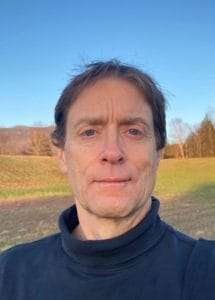Dear Editor,
I am Peter Duval and I am a candidate for governor of Vermont. If you are concerned about climate, carbon offsetting and trading, food self-sufficiency, the cost of living, mass extinction, or the war in Ukraine then this may be the campaign for you. The campaign will question assumptions and rationalizations, and connect the issues.

Peter Duval
This is an all-volunteer campaign. Democracy needs your involvement, and the planet needs this campaign. I ask Vermonters to identify issues that have become clichés and to help describe and address underlying problems. Be an agent of change. I imagined a speech that is a lot more like the type that politicians used to give. As Eisenhower was, I am concerned about the bloat of industrial complexes. As Reagan was, mindful of the sluggishness of bureaucracy. Carter acknowledged our wasteful consumption of natural resources and the need to change our “ways of living” — something that I believe we all know to be true, then and now. States have foreign affairs. Vermont, for example, has a special relationship with Québec that is commercial, cultural and historical. Strengthening those ties is important for Vermont’s future, as is maintaining awareness of global events and opportunities. Good ideas, good policy, and good friends are waiting to be found everywhere around the planet. Governors have a responsibility to seek out best practice, no matter its source.
The recognition and identification of environmental problems is expanding. These issues cannot be addressed in isolation. Climate, biodiversity, ocean acidification, pollution, plastics, food, water, overshoot, overhunting, overfishing, invasives, depletion, erosion, habitat loss — we all know these interrelated words of environmental degradation. We know that they are connected to human suffering, and are the result of a big human population with a way of living that is incompatible with life on Earth. The ozone hole is the only environmental issue that has been effectively addressed merely through technology substitution. For the rest, there has been considerable hand-wringing, even shouting, but a stubborn refusal to connect the dots and recognize that systemic change cannot be put off.
The Russian invasion of Ukraine — Putin’s War — places even greater urgency on action. Our demand for oil pushes up its price, affecting all global commodities. That puts money in Putin’s pocket. We could be doing less to prop up Russia, while improving our own situation in the process. We can reduce fossil fuels — significantly — right now. Each one of us individually, and every business, every municipality, and the state, itself, can take action to end our dependence on fossil fuels.
It is conservation that is needed to respond to the war, not efficiency, and we can do it without delay and with immediate cost savings — savings that can be applied to a permanent transition to a just and sustainable future. Conservation and redesigning how we live —right now — has immediate benefits for our health, structure of our communities, and quality of the natural environment. The pandemic has shown that we can respond quickly. Individual action is important, but being organized and cooperative is necessary to amplify individual effort toward a new and different way of living. It is a civic duty that we all share.
There are market advantages to catching up and becoming a first-mover. Time and again, “we did it first” and “we did it differently” has benefited Vermont, a state that leads by example. A rapid transition must be done to secure a livable future for our descendants — on the only planet in the universe known to sustain life. That’s why I am running for governor: To connect the issues, unearth hidden assumptions and opportunities and, if elected, to effect a rapid transition to a new path within two years. And that’s why this is a fusion campaign. It will be a campaign of choices, not echoes. Find out more and join this fusion campaign by visiting PeterForVermont.Earth.
Peter Duval, Underhill




